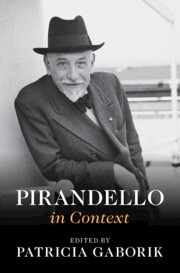Book contents
- Pirandello in Context
- Pirandello in Context
- Copyright page
- Dedication
- Contents
- Figures
- Contributors
- Preface
- Acknowledgments
- Chronology
- List of Cited Titles in Translation and the Original Italian
- Part I Places
- Part II Institutions
- Part III Interlocutors
- Part IV Traditions and Trends, Techniques and Forms
- Part V Culture and Society
- Chapter 25 History
- Chapter 26 Celebrity
- Chapter 27 Cinema
- Chapter 28 Modernity
- Chapter 29 Fascism
- Chapter 30 Women
- Chapter 31 Religion
- Chapter 32 Madness
- Chapter 33 Suicide
- Part VI Reception and Legacy
- Further Reading
- Index
Chapter 29 - Fascism
from Part V - Culture and Society
Published online by Cambridge University Press: 14 March 2024
- Pirandello in Context
- Pirandello in Context
- Copyright page
- Dedication
- Contents
- Figures
- Contributors
- Preface
- Acknowledgments
- Chronology
- List of Cited Titles in Translation and the Original Italian
- Part I Places
- Part II Institutions
- Part III Interlocutors
- Part IV Traditions and Trends, Techniques and Forms
- Part V Culture and Society
- Chapter 25 History
- Chapter 26 Celebrity
- Chapter 27 Cinema
- Chapter 28 Modernity
- Chapter 29 Fascism
- Chapter 30 Women
- Chapter 31 Religion
- Chapter 32 Madness
- Chapter 33 Suicide
- Part VI Reception and Legacy
- Further Reading
- Index
Summary
The chapter focuses on a controversial element of Pirandello’s life and career, namely, his relationship to Italian Fascism and its head of government, Benito Mussolini. Taking Pirandello’s outspoken and loyal adhesion to the Fascist government as a matter of historical fact and arguing that true “faith” in its ethos and professional opportunism on Pirandello’s part were not mutually exclusive, the essay focuses on the personal, cultural, and professional reasons for Pirandello’s membership in the party and then moves on to discuss how contemporaries viewed the author’s work in relation to Fascism’s ideological precepts. Because he was so famous, regime intellectuals were keen to claim Pirandello as their own, but whether they read his work as compatible with their world view had much to do with its philosophical bent, as interpreted through the formulations of Adriano Tilgher. If they perceived Pirandello as nihilistic, they tended to doubt his Fascism, but if they read his work as celebrating the victory of life over form, they judged it as representative of the spirit of the so-called new era.
Keywords
- Type
- Chapter
- Information
- Pirandello in Context , pp. 235 - 242Publisher: Cambridge University PressPrint publication year: 2024

